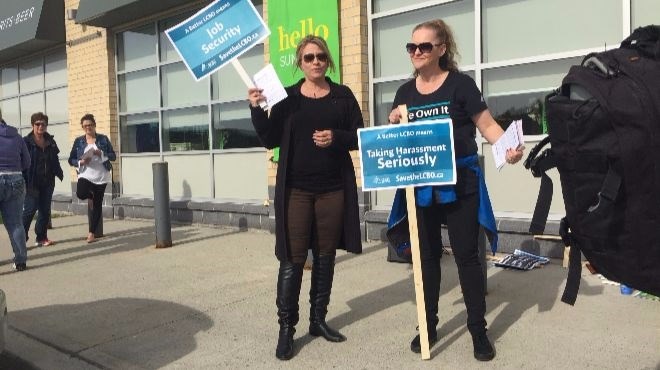Educating the public on how the LCBO helps the public and fighting further privatization was the goal of an information picket last week in Sudbury.
Local OPSEU members were joined at the Marcus Drive outlet by Denise Davis, who is chair of the union's bargaining team in contract talks with the province.
"In May, they said they had no more (bargaining) dates for us, so we wanted to get out here and picket and talk to our customers and the public about this," Davis said.
"Just in the last little while, Premier (Kathleen) Wynne has announced that even more grocery stores will have beer, wine and cider. That doesn't make us too trustworthy of the government right now. Those profits will be going to private investors and not back to public services that the public deserves. We're here to educate people on that."
"We're here to talk with people and get them to learn why we're here and why we're bargaining for a fair contract," said Jamie Kensley, president of OPSEU Local 681, which represents about 150 workers in Sudbury and the surrounding areas. "We're hoping by engaging with people, they'll support us even more and get to know the big picture as to why we're doing this."
While some members of the public may like the idea of being able to buy beer or wine in grocery stores, Kensley said it puts the good things the LCBO does at risk.
"First of all, it means good jobs in the community,” he said, of keeping liquor sales in the public sector. "There's the convenience of the Walmarts and all that, but it's the social responsibility that we take very seriously. We feel we do that job extremely well, our employer thinks we do that job extremely well. We want people to realize we're out there trying to protect the community.
Contrary to public perception, Davis said 84 per cent of LCBO workers are casual or part-time, many of whom work two-hour shifts every day for more than a decade without getting full-time jobs.
"The majority of them make less than $30,000 a year," she said. "So people walk in and think everybody (at the LCBO) has a good job, but no. Many have to work two or three jobs. And they're waiting 14 years to get a full-time job."
Kensley compared what the Wynne government is doing to Ontario Hydro, which the province is partially privatizing. That puts at risk the $2.4 billion in profits from LCBO that go back into public services, he said.
"Our take is the LCBO belongs to every Ontarian,” he said. “It's a public asset. Who gave permission to Wynne to sell it off? It's the same with hydro. They're calling it expansion, but really, it's backdoor privatization."
Davis said as the province expands the number of grocery stores that sell alcohol, and the use of private owners of LCBOs – known as agency stores – she fears stores will begin to close.
"Up in the North here, they're getting cannibalized by agency stores run by private owners,” she said. “And now the grocery stores are coming in. We have no protection when it comes to the grocery stores being in the same parking lot as our LCBO stores. The government isn't protecting an asset we all own.
"We feel like Wynne doesn't know what she's doing. She doesn't have any right to do this."
As far as contract talks, Davis said they begin again next month, but isn't optimistic.
“Things are moving very slowly. We have been totally available, totally engaged. But we don't see that they are."
